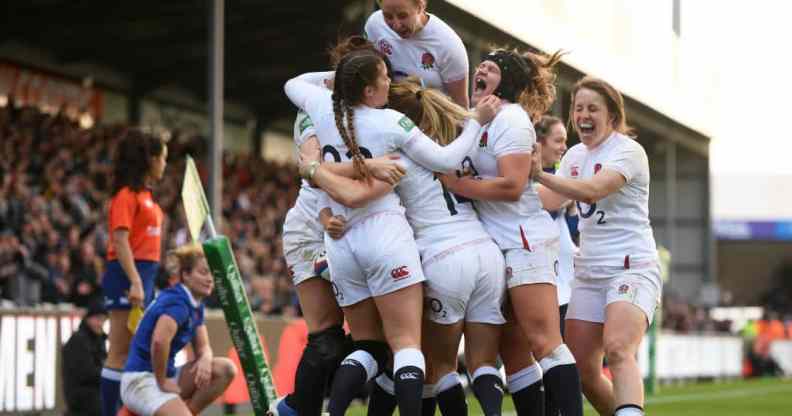Women’s rugby team systematically debunks arguments against including trans women

The England Women rugby team in 2019. (Getty)
A women’s rugby union team has explained why it is passionate about including trans women as the RFU votes on banning them from the sport.
The York RI Ladies team took to Twitter ahead of a Rugby Football Union (RFU) vote on an outright ban on trans women and girls, taking place on Friday (29 July).
The RFU, which governs rugby union in England, will vote on a recommendation for a “policy change for contact rugby to only permit plays in the female category whose sex recorded at birth was female”. The measure will allow trans men to continue to play the sport “if they provide their written consent and a risk assessment is carried out”.
The governing body says it has considered “peer reviewed research” which claimed there are “physical differences between those people whose sex was assigned as male and those as female at birth, and advantages in strength, stamina and physique brought about by male puberty are significant and retained even after testosterone suppression”.
The York RI Ladies said there was a lot of “conflicting information” about transgender women in rugby and that it wanted to “do a bit of mythbusting”.
Our tweets about trans inclusion have gained a bit of traction, and we're conscious that there is a lot of conflicting information out there at current, so we thought we'd do a bit of mythbusting ahead of the vote on Friday 🧵
— York RI Women’s RUFC (@YorkRIWomen) July 28, 2022
In 2020, World Rugby published guidelines that trans women should be banned from women’s rugby union. The RFU didn’t follow suit, and right now imposes testosterone limits on trans women.
The York RI Ladies tweeted: “In 2020 World Rugby banned trans women from competing citing potential risk of injury. RFU differed from World Rugby saying there wasn’t enough evidence to prove the additional risk at present. To our knowledge there has been no additional evidence published since this decision.”
The team explained that for trans women to play they have to have “stabilised testosterone under 5noml/L for 12 months,” which they noted is “below many cis women.”
Again, they reiterated their point that there is “little evidence to prove that testosterone advantage is retained after this stage”.
The explained that if safety is a concern then “coaches or refs can veto their participation.”
It’s believed there are six trans women playing community rugby union in England, which as the team pointed out, isn’t enough for a single sevens team.
After these steps there are currently 6 (yes 6) trans women rugby players in England. If they all banded together, they wouldn't have enough players for a 7s team. The '70 trans people!' figure you may have seen includes trans men and NB people, many of whom play different codes.— York RI Women’s RUFC (@YorkRIWomen) July 28, 2022
The RFU proposed that trans women who weigh more than 90kg, are taller than 170 cm or both must undergo a “risk assessment” to decide if they’d pose a threat to cis women.
But York RI Ladies said that this didn’t make sense as it would cover “most women’s rugby players”.
“Rugby teams have incredibly diverse body types – it’s one of the key strengths of the game,” the team wrote, adding: “Players of different sizes and strengths are always tackling each other. That’s the game.”
Rugby teams have incredibly diverse body types – it's one of the key strengths of the game. The 6'4 'brick shithouse' people are panicking about? We've played her, she was cis, and our 5'0 scrum half took her down by the ankles.— York RI Women’s RUFC (@YorkRIWomen) July 28, 2022
The team shut down the notion that the participation of trans athletes would somehow hurt cis women.
“If the @RFU can produce sport-specific non-computerised data on disproportionate risk to cis women from trans women, we’ll eat our scrum caps. Until then, we’ll speak out against discrimination.”
York RI Ladies rounded off is statement by calling for people to stop attacking trans women and to instead “donate to your local women’s team.”
On Friday (29 July), protestors have gathered outside Twickenham stadium to protest the RFU vote with around 30 players fighting for inclusion.
Charley Brunton, who plays for Hove and attended the protest, told The Telegraph: “There is no record of injuries from trans players at all. If they care about women and the women’s game, they should be investing into it more.”
“Trans women are not the threat. It’s a lack of support from the RFU that is a threat to women’s rugby.”

